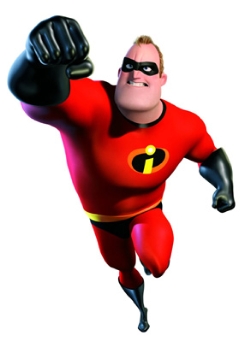
|

|

|

|

|

|

"The Incredibles"
Disney/Pixar
2004
PG
Warning: this review does not detail the precise ending, but it does discuss much of the plot.
We're supposed to be impressed with all the effort that went into the animations for "Incredibles" and give it a pass for its more intellectual side. Nonetheless, "Incredibles" relies on violence and bourgeois notions of heroes to sell, so we looked all the way into this movie. For this reviewer, it took a while, but eventually we all should conclude that this movie is mostly backwards and in fact leans solidly fascist.
Just as the heroic entrepreneur of Libertarian and Republican fame finds him or herself strangled by government regulations in Amerika, this story is about the restraints of the mediocre on the meritorious superheroes known as "Incredibles." What makes this a fascist movie is precisely the alleged exposure of bureaucracy in an insurance company, which by itself would be progressive or socialist. Combined with the notion of super-heroes being better than bureaucracy, the effect is fascist, because we do not really see an economic solution for the insurance company problem. Instead, the movie bemoans the competition that led to the creation of the insurance company while supporting competition of superheroes. It does not fit together coherently, but we've learned historically that fascism does not have to be coherent for the masses to take it up.
Whether it is the huge insurance company bureaucracy or the efforts of the movie villain, the point is that no one is special. When we hear this sort of critique we have to watch out and distinguish between two kinds. Often it comes from an anarchist direction opposing how capitalism takes everything of originality and turns it into a commodity to sell to everyone, thereby watering down and changing the original inspiration of the commodity. Such critiques are progressive. However, because of its real lack of a message on economic competition, "Incredibles" falls into that category of preserving uniqueness and the elite coming from the fascist side. A book titled The Revolt of the Masses by Jose Ortega y Gasset comes to mind for its defense of the elite of yore against the "mass man." Nonetheless, according to MIM, the ones who are going to restore the alleged elite are none other than fascists of the kind who installed Mussolini and Hitler with their rhetoric about looking back to the German peasant or the Roman Empire.
The directors of this film were probably just angry with previous MIM reviews trashing all the super-heroes as fronts for the police. So in "Incredibles" we learn that super-hero work is not politically neutral, just as MIM said all along, but "Incredibles" agrees only to ridicule the premise in typical Republican Party rhetoric. The MIM version of the "Incredibles" will be more like the Schwarzenegger film "Running Man," where people listen in on the police scanner with pornographic fascination, both excited and placated, while elite schemers feed them enough crime for their own self-serving purposes.
In any case, the real organizing clue of the reactionary nature of this film is the villain. Cast as a humiliated child who grew up to do evil, the villain is in fact a representative of all the intellectual gains of the Enlightenment now under attack in the united $tates with creationism and other white theocratic schemes. The villain informs us that he is going to make the superpowers of superheroes available to all through his ingenious inventions. He was just about to succeed when the superheroes stopped him and preserved their own elite status with crowds cheering the "old school." In fact, the villain planned to give everyone his technology free and he only had to kill off the superheroes to do so, which pretty much stands in for his supposed evil plot to prevent anyone from becoming "special." Just as mother superhero tells her children that "everyone is special" so that they should conform and fit in, the children retort that that's just another way to say no one is special. Viewers paying close attention will also note a baby superhero character turning into a Satan image, which is to say that the Satanist elitist ideology is "natural," while the Promethean ideology of the villain is self-defeating and destructive. This is a case where MIM again sides with the villain and not the superhero children.
Indeed, the angle on the children in this film is also in favor of eugenics, another linchpin of fascism. The villain is the villain only because he does not have his own "natural" superpowers, but has to invent them through a technology that potentially equalizes everyone. Hence, there is an emphasis on the breeding of superheroes by superheroes. It were as if the director of the film read MIM's view of technology and its potential accessibility and decided to take the mirror opposite view.
Satanists watching this film should note the clear choice at the end. Their beloved ideology supporting elites against the mass man and supporting Nietzsche for superheroes ends up nothing but a rehashing of the Greek gods/other polytheistic schemes of fire, water, force fields etc. And against this notion of the many gods, the director of this film pits the humyn will to technology and intellectual improvement. Screw the superheroes, not for lacking liability insurance, but just for opposing technological advance and daring to call it the failure of the mediocre.